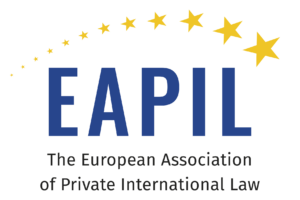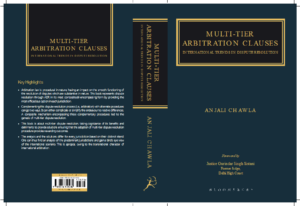Views
Nothing Found
Sorry, no posts matched your criteria
News
EAPIL-BIICL Seminar on the Rome II Regulation

 On 2 December 2022, from 4 pm to 5.30 pm (MET), the European Association of Private International Law (EAPIL) will hold a joint Seminar with the British Institute of International and Comparative Law (BIICL). The Seminar will focus on the review of the Rome II Regulation and will, in this context, shed light on the Study that was prepared in 2021 by BIICL and Civic Consulting to support the preparation of the Commission report on the Regulation’s application. The seminar will focus on general issues as well as a selection of specific subjects.
On 2 December 2022, from 4 pm to 5.30 pm (MET), the European Association of Private International Law (EAPIL) will hold a joint Seminar with the British Institute of International and Comparative Law (BIICL). The Seminar will focus on the review of the Rome II Regulation and will, in this context, shed light on the Study that was prepared in 2021 by BIICL and Civic Consulting to support the preparation of the Commission report on the Regulation’s application. The seminar will focus on general issues as well as a selection of specific subjects.
Programme
4.00 pm: Introduction – Overview of the Study
Constance Bonzé, BIICL (UK) and Eva Lein, BIICL (UK)/University of Lausanne (Switzerland)
4.15 pm: Focus I – Financial Loss
Xandra Kramer, University of Rotterdam (Netherlands)
4.25 pm: Focus II – Artificial Intelligence
Martin Ebers, University of Tartu (Estonia)
4.35 pm: A View from Practice
Marie Louise Kinsler, KC, 2 Temple Gardens, London (UK)
4.45 pm: Discussion
Participation and Registration
The Seminar will take place via Zoom. Registration is possible via this link. Registered participants will receive all necessary information one day prior to the event (i.e. on 1 December 2022).
Background
The EAPIL (Virtual) Seminar Series wishes to contribute to the study and development of (European) Private International Law through English-language seminars on topical issues. It will provide an easily accessible and informal platform for the exchange of ideas – outside the bi-annual EAPIL conferences. At the same time, it will serve as a means for EAPIL members to connect with other EAPIL members and non-members.
Out Now! ‘Multi-Tier Arbitration Clauses: International Trends In Dispute Resolution’ by Anjali Chawla

About the Book
Streamlining disputes has become imperative to reduce the judicial caseload. One may presume that resorting to arbitration or other forms of ADR when the parties wish to resolve their issues amicably might provide them with a speedier remedy. Considering that commercial disputes now are extensively complex and cumbersome, there arose a need for a more evolved dispute resolution mechanism that could cater to the needs of each contract or dispute in a customised manner. MTDR can aid in doing so. It entails successfully employing different kinds of ADR for the same dispute in case there is no resolution. However, MTDR comes with its fair share of issues, such as reservations amongst the parties, lack of rules governing such procedures, limitation period, lack of party cooperation and the non-binding nature of certain forms of ADR. These pertinent questions are merely the tip of the iceberg when it comes to Multi-Tiered Dispute Resolution. The objectives of Alternative Dispute Resolution are saving time and reducing costs. At the end of the day, it is imperative to answer whether Multi-Tier Dispute Resolution is viable in achieving these objectives or if it will manifold the complexities involved in the process. Yet if there is even a possibility of settling disputes or at least parts of the dispute amicably, this concept is worth a chance. Despite the United Nations’ endeavours to promote uniform interpretations of the arbitration law worldwide, several nations have taken varying stands on the enforceability of certain dispute resolution procedures, calling for a study of the varying standards in different jurisdictions. For any dispute resolution mechanism to be effective, the codified law and the jurisprudence of a particular state need to be conducive to enforcing the process adopted by the parties. Thus, in-depth analysis and critical review of this subject’s laws and judicial pronouncements have been demonstrated. This book aims to assist the reader in overcoming the issues that one might face with MTDR in a wide range of jurisdictions to make this process of dispute resolution useful, effective and fruitful. The book covers MTDR in different jurisdictions like the UK, USA, France, Canada, Australia, Singapore, Germany, Hong Kong, China, Taiwan and India. The functionality of any reform, particularly one that seeks to provide a multi-faceted solution, predominantly lies in the academic enrichment of the same. Policy and academia can only strengthen public awareness of Multi-Tier Dispute Resolution.
The Book is available for purchase on the Bloomsbury website using this link.
About the Author
Anjali is an Assistant Professor at Jindal Global Law School, O.P. Jindal Global University. Anjali holds an LL.M. in International Commercial Arbitration Law from Stockholm University (SU); and B.A. LL.B. (Hons.) degree from Jindal Global Law School, O.P. Jindal Global University, Sonipat (India). She is also a qualified lawyer at the Bar Council of India. She has also been advising domestic and international clients regarding commercial and civil disputes. Anjali is also acting as a Dispute Resolver (Mediator/Arbitrator/Conciliator) for various ODR platforms. Anjali sits on the Editorial Board of Legal Maxim and the Review Board of Syin & Sern.
Today begins the first meeting of the Special Commission to review the practical operation of the HCCH 2000 Protection of Adults Convention
The first meeting of the Special Commission to review the practical operation of the HCCH 2000 Protection of Adults Convention will be held today in The Hague and will last until 11 November 2022. This event is remarkable given that this is the first time that the practical operation of this Convention is assessed since its entry into force on 1 January 2009.
A few topics of the agenda are worthy of note. I would like to highlight two:
The first topic deals with the tools to assist with the implementation of the 2000 Convention and is broken down as follows:
- Improving accessibility to the existing model forms
- Direct judicial communications and a possible network of judges under the 2000 Protection of Adults Convention. See here.
- Finalisation and adoption of the Practical Handbook on the Operation of the 2000 Protection of Adults Convention
- Finalisation and adoption of the Implementation Checklist under the 2000 Protection of Adults Convention
- Finalisation and adoption of the 2000 Protection of Adults Convention Country Profile
The second topic and undoubtedly fascinating to any international lawyer – if only with regard to treaty law – is the agenda item: Possible amendments to the 2000 Convention. For more information, click here. This agenda item contains the following sub-items:
- Interest in deleting the terms “guardianship” and “curatorship” (Art. 3(c))
- Interest in adding a new conflict rule for “ex lege representation”
- Interest in adding a provision on “instructions given and wishes made by the adult e.g. advance directives”
- Interest in adding final clauses allowing Regional Economic Integration Organisation to join the 2000 Convention
- Possible mechanisms to amend the 2000 Convention


